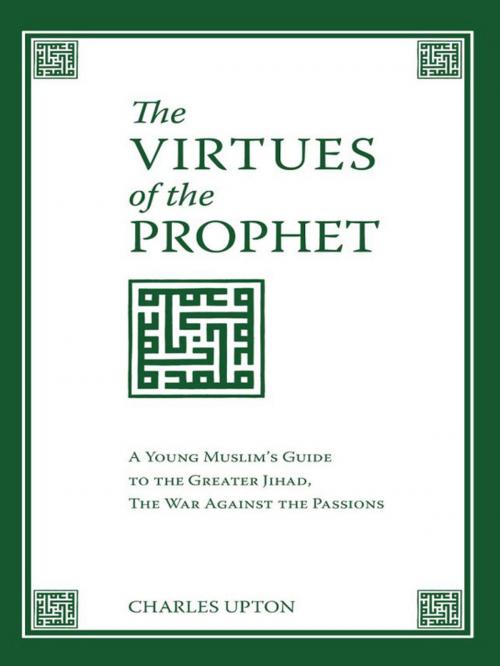The Virtues Of The Prophet
A Young Muslim’s Guide to the Greater Jihad, The War Against the Passions
Nonfiction, Religion & Spirituality, Middle East Religions, Islam| Author: | Charles Upton | ISBN: | 9781597319898 |
| Publisher: | Sophia Perennis | Publication: | July 16, 2006 |
| Imprint: | Sophia Perennis | Language: | English |
| Author: | Charles Upton |
| ISBN: | 9781597319898 |
| Publisher: | Sophia Perennis |
| Publication: | July 16, 2006 |
| Imprint: | Sophia Perennis |
| Language: | English |
IN THE RELIGION OF ISLAM the character of the Prophet Muhammad, peace and blessing be upon him, is the model of human virtue. Orphan, exile, contemplative, successful businessman, long-time faithful husband to one wife, husband to several wifes in his later years, statesman, judge, warrior, conqueror, lawgiver, peacemaker, spiritual teacher, Muhammad is the complete man, the exemplar of broad and balanced character whose sunnah (habitual and characteristic way of acting) is the deal of human behavior for the traditional Muslim world. Dar-al-Islam is presently under ruthless attack from the forces of secular modernization, as well as those of the Islamicist reaction; both sides are attempting to trim Islam down to fit their own shrunken ideologies. Under such damaging blows, young Muslim need to remember not just the Holy Book, but the man whose character was the perfect mirror of that Book. Both modernizers and Islamicists want to narrow down, marginalize, and perhaps even do away with the example of the Prophet; he was too complete and genuine a human being to fit into their increasingly inhuman agendas. Human life requires heroism in any time, and the duties of self-development and self-mastery call for a greater degree of heroism than any other struggle, which is why the Prophet called the war against the sub-human aspects of one’s own soul ‘the greater jihad’. Alone of all creatures, human beings are not simply established as themselves by God, but are required by God to become themselves. It is easy to throw one’s life away, either in the name of a cause or at the ever-present command of the vices and passion; much harder and requiring an even greater degree of courage is the struggle to grow and live, so as to become a human being. We must be prepared to nurture and develop life, both of our own salvation and in the name of future generations. This unity of heroic abandon with painstaking and compassionate care is the essence of the traditional Muslim character, which is nowhere more clearly visible than in the character of the Prophet Muhammad, peace and blessing be upon him, who said: ‘Even if you know that the world will end tomorrow, plant a tree’. Charles Upton is a serious thinker from whom I have learned much. His writing merits close attent
IN THE RELIGION OF ISLAM the character of the Prophet Muhammad, peace and blessing be upon him, is the model of human virtue. Orphan, exile, contemplative, successful businessman, long-time faithful husband to one wife, husband to several wifes in his later years, statesman, judge, warrior, conqueror, lawgiver, peacemaker, spiritual teacher, Muhammad is the complete man, the exemplar of broad and balanced character whose sunnah (habitual and characteristic way of acting) is the deal of human behavior for the traditional Muslim world. Dar-al-Islam is presently under ruthless attack from the forces of secular modernization, as well as those of the Islamicist reaction; both sides are attempting to trim Islam down to fit their own shrunken ideologies. Under such damaging blows, young Muslim need to remember not just the Holy Book, but the man whose character was the perfect mirror of that Book. Both modernizers and Islamicists want to narrow down, marginalize, and perhaps even do away with the example of the Prophet; he was too complete and genuine a human being to fit into their increasingly inhuman agendas. Human life requires heroism in any time, and the duties of self-development and self-mastery call for a greater degree of heroism than any other struggle, which is why the Prophet called the war against the sub-human aspects of one’s own soul ‘the greater jihad’. Alone of all creatures, human beings are not simply established as themselves by God, but are required by God to become themselves. It is easy to throw one’s life away, either in the name of a cause or at the ever-present command of the vices and passion; much harder and requiring an even greater degree of courage is the struggle to grow and live, so as to become a human being. We must be prepared to nurture and develop life, both of our own salvation and in the name of future generations. This unity of heroic abandon with painstaking and compassionate care is the essence of the traditional Muslim character, which is nowhere more clearly visible than in the character of the Prophet Muhammad, peace and blessing be upon him, who said: ‘Even if you know that the world will end tomorrow, plant a tree’. Charles Upton is a serious thinker from whom I have learned much. His writing merits close attent















